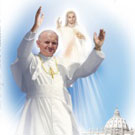Today is the feast of St John Fisher and St Thomas More, perhaps the two most famous martyrs of the English Reformation. Longterm readers will know already how much I admire St Thomas.
Today’s feast coincides with a tour of the martyrs’ relics around the United States. To celebrate the tour, Scepter Publishing has made freely available for download two booklets about St Thomas More.
One of the interesting things about both men is that they are unlikely heroes and reluctant martyrs. They differ from St Edmund Campion, for example, who was born into an age of persecution and always knew the potential cost of proclaiming the Faith. In contrast, Cardinal Fisher and Sir Thomas had persecution and martyrdom unexpectedly thrust upon them. They met their fate with poise and good humour.
Cardinal Fisher’s final request, prior to his execution on 22 June 1535, was time for a siesta. He slept soundly for two hours. I suppose he had been deprived of decent sleep for some time, so the request was very practical. But it also demonstrates the serenity which God granted him in his final hours.
Two weeks later, on 6 July 1535, when Sir Thomas endured his own final moments, he famously joked with the axeman. More had been clean shaven throughout the divorce controversy which led to his trumped up charges, but during his years of imprisonment he had grown a long beard. As he laid his head on the chopping block, he removed his beard away from the path of the blade, for “This hath not offended the king.”
Hopefully we will never personally encounter the persecution and martyrdom which was thrust upon Fisher and More. But still they are outstanding models for us when we endure smaller trials and occasional enmity. I think their serenity and good humour are as important as their integrity and charity.
During his imprisonment More composed and prayed a beautiful prayer for his enemies. A prayer we can make our own.
Almighty God, have mercy on N. and N., and on all that bear me evil will, and would me harm, and their faults and mine together by such easy, tender, merciful means as thine infinite wisdom best can devise; vouchsafe to amend and redress and make us saved souls in Heaven together, where we may ever live and love together with thee and thy blessed saints, O glorious Trinity, for the bitter passion of our sweet Saviour Christ. Amen.
Lord, give me patience in tribulation and grace in everything, to conform my will to thine, that I may truly say: “Fiat voluntas tua, sicut in cælo et in terra.”
The things, good Lord, that I pray for, give me thy grace to labour for. Amen.






I think I rather refer to the “English reformation” as the “English deformation” as it reformed nothing but rather distorted and deformed what was Truth. Such two very important saints for our time as we face once again the redefinition of marriage or as it was referred to back in Thomas More’s day as “the king’s great matter”.
Fair point Cathy. An historian told me yesterday that of all the countries in Christendom, England was the least likely to be attracted to Protestantism. The Catholic Church in England had already undergone a humanist reform in the previous decades, it was competently governed, and the popular faith of the English people was unusually fervent and Marian. “The King’s great matter” is the sole reason England was ever mixed up in the Protestant revolt.